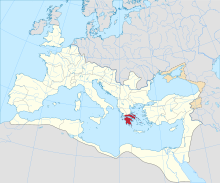This article needs additional citations for verification. (June 2009) |
| Achaia Ἀχαΐα | |||||||||||
|---|---|---|---|---|---|---|---|---|---|---|---|
| Province of the Roman Empire | |||||||||||
| 27 BC–7th century | |||||||||||
 The province of Achaia within the Roman Empire, c. 125 AD | |||||||||||
| Capital | Corinth | ||||||||||
| Historical era | Antiquity | ||||||||||
• Separated from the Province of Macedonia | 27 BC | ||||||||||
• Reorganized into the Theme of Hellas | 7th century | ||||||||||
| |||||||||||
| Today part of | Greece | ||||||||||
Achaia[1][2] (‹See Tfd›Greek: Ἀχαΐα), sometimes spelled Achaea,[3][4] was a province of the Roman Empire, consisting of the Peloponnese, Attica, Boeotia, Euboea, the Cyclades and parts of Phthiotis, Aetolia and Phocis. In the north, it bordered on the provinces of Epirus vetus and Macedonia. The region was annexed by the Roman Republic in 146 BC following the sack of Corinth by the Roman general Lucius Mummius, who was awarded the surname "Achaicus" ('conqueror of Achaia'). Initially part of the Roman province of Macedonia, it was made into a separate province by Augustus.
Achaia was a senatorial province, thus free from military men and legions, and one of the most prestigious and sought-after provinces for senators to govern.[5] Athens was the primary center of education for the imperial elite, rivaled only by Alexandria, and one of the most important cities in the Empire.[5] Achaia was among the most prosperous and peaceful parts of the Roman world until late antiquity, when it first suffered from barbarian invasions. The province remained prosperous and highly urbanized, however, as attested in the 6th-century Synecdemus.
The Slavic invasions of the 7th century led to widespread destruction, with much of the population fleeing to fortified cities, the Aegean islands and Italy, while some Slavic tribes settled the interior. The territories of Achaia remaining in Byzantine hands were grouped into the theme of Hellas.
- ^ /əˈkaɪə/
- ^ Barrington Atlas, map 100
- ^ /əˈkiːə/
- ^ The spelling "Achaea" is based on an erroneous but well-established transliteration of the Greek original (which does not have a diphthong) and in disregard of the Latin spelling (Achaia). The Cambridge University Press's publication "Pausanias' Greece" claims (on p.1): "Following modern standard usage, 'Achaia' refers to the Roman province, 'Achaea' to an area of the northern Peloponnese." Furthermore, Oliver (1983) The Civic Tradition and Roman Athens, p. 152 n. 6: 'The name of the province is Achaia. [...] It is so spelled in good manuscripts of [Tacitus, Suetonius, and Seneca] and all Latin inscriptions.' The transliteration "Akhaïa" of the (Ancient and Modern) Greek is sometimes used in English, for example by the Encyclopædia Britannica and the Collins English Dictionary as an alternative to "Achaea".
- ^ a b Roman provincial coinage: Τόμος 1, Andrew Burnett, Michel Amandry, Pere Pau Ripollés Alegre - 2003